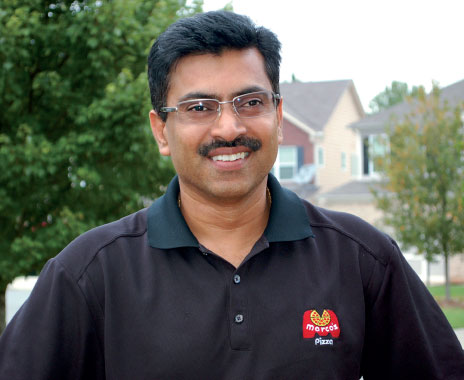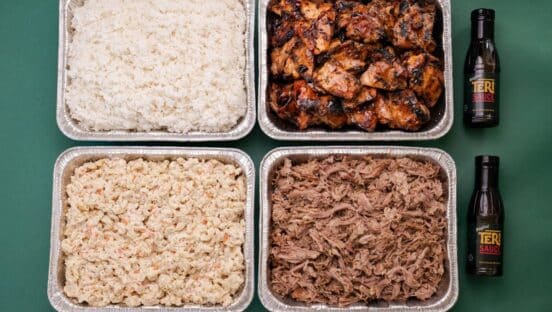DJ Patel only had $100 in his pocket when he arrived in the U.S. in 1987. Before he moved to the States, while working in his father’s pharmacy in India throughout his college career, Patel had a difficult time finding a job in his field of study: geology.
With a helpful tip from a friend after arriving in the U.S., Patel entered the quick-serve industry, using his managerial experience gained by overseeing his father’s pharmacy to start as an assistant manager with Pizza Hut. He would go on to total more than 22 years in different roles throughout his tenure at Pizza Hut.
Today, Patel serves as both a franchisee for Marco’s Pizza and as an area developer for the brand, overseeing 26 Marco’s units in the Atlanta metro area.
Patel attributes most of his success to running his franchised units and area-developer units as a franchisee who “gets it.” He shares his thoughts on how franchisees can work with their superiors and what brand developers are looking for and expecting from new franchise partners.
1. Be visible
Having so many roles throughout my quick-serve experience helped me know exactly what to look for when I started as an area director with Marco’s. From being an area coach to a lead-area coach to a restaurant readiness coach with Pizza Hut, I had the know-how to say what works or doesn’t work when it comes to developing a brand.
Most of the development comes from finding, retaining, and continually motivating franchisees. All of my experience helped me to be a successful leader, but also gave me the knowledge to know what a good follower looks like, too. This is so important in the beginning for franchisees; they tend to get caught up in trying to grow as big as they can and as fast as possible. Know the concepts first. Growth will happen naturally if you focus on operations and understand the key concepts of business first and foremost.
When it comes to growing, you need to stay visible. You have to be present in the field and make it apparent that doing so is important for you, your team, and the brand in general. For instance, one of the many things that Marco’s as a brand has to offer is that 80 percent of its leadership team is made up of franchisees. The same people dedicated to leadership positions have the same day-in and day-out responsibilities as a lot of franchisees they oversee.
They make themselves visible, apparent in the business, and stay transparent.
2. Share the vision
I am a very black-and-white sort of manager. I tend to communicate everything to my team and franchisees. I stay honest. A lot of this honesty comes from having continual one-on-one conversations with franchisees, and sharing the vision for the growth of the brand.
Managing a restaurant is one thing, but developing a brand is different. I need franchisees that have the same goal. This goal needs to flow over in all aspects of the business: marketing, operations, finding the right vendors, etc. The vision for the brand and the mentality of growth is extremely important.
Franchisees also need to do their homework when it comes to branding and brand growth. Again, running a business can be done if you follow the steps correctly, but the real growth comes from staying visible in the community and being honest with your team, employees, and customers.
I never was a franchisee under Pizza Hut, but strictly a corporate employee throughout my career. Because of that, I became very good at developing people to develop the brand further. Franchisees are at the root of that development and need to recognize that importance throughout the longevity of their business.
3. Always analyze
No matter where you are, or at what level, take a couple steps back and analyze yourself. It seems that this industry leaves franchisees with very little time to do anything, let alone take a wide-angled view of their business and its development.
Again, a lot of franchisees get caught up with trying to grow too quickly without having solid practices, procedures, and managerial tactics solidified. Master your concepts first, and then grow as big as you want.
You have to look at your business with a different eye from time to time. I tend to be a simple operator and follow the same rubric from start to finish: I plan, put the processes in place, execute, and follow up. In that order, and every time. I communicate the same thing with each and every franchisee I come into contact with. These are the concepts that separate you not only from competitors in the field, but also among fellow franchisees, even in the same brand.
You’re going to continually follow these steps throughout the time with the brand, and each unit will fall under your simple, yet effective, direction and leadership.
4. Develop with the developers
I always try to communicate that I don’t sell dreams, but make it easier for you to reach them. I try not to work as a leader, but as a partner.
Starting with very little exposure with the industry, it’s amazing what this simple partnership can do long-term. Marco’s, for instance, has a terrific outlook on continuing partnerships from the top, all the way down the ladder.
Having that type of relationship with the franchisor is key and will only help you long-term. Additionally, it shows area developers that you’re taking every step to solidify your presence and grow the brand.
Doing your homework, not getting ahead of yourself, and sharing the same mentality as your developers or area representatives will merit positive results across the board.







